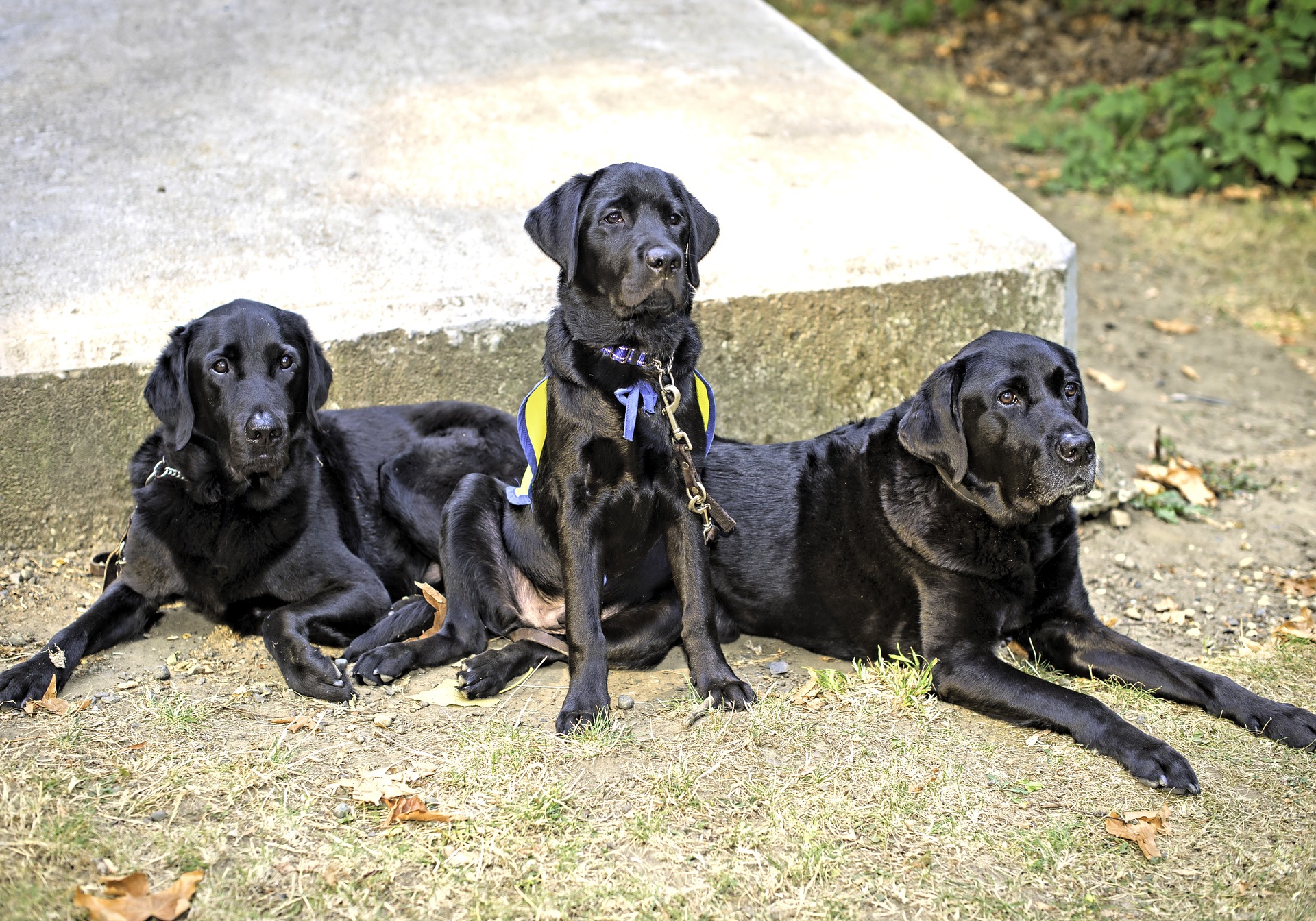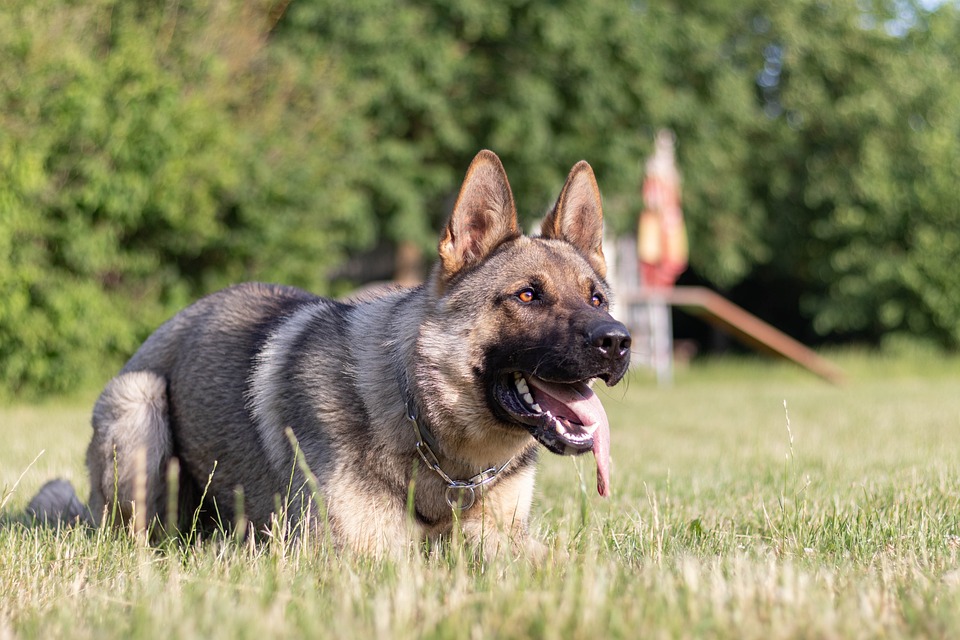- What Are Psychiatric Service Dogs?
- Who Is Eligible for a Psychiatric Service Dog?
- Do You Need a Medical Letter for a Psychiatric Service Dog?
- What Type of Training Do Psychiatric Service Dogs Undergo?
- What Dogs Can Become Psychiatric Service Dogs?
- How Can You Train a Psychiatric Service Dog (Owner-Trained vs Professionally Trained)
- Psychiatric Service Dog Registration & Certification
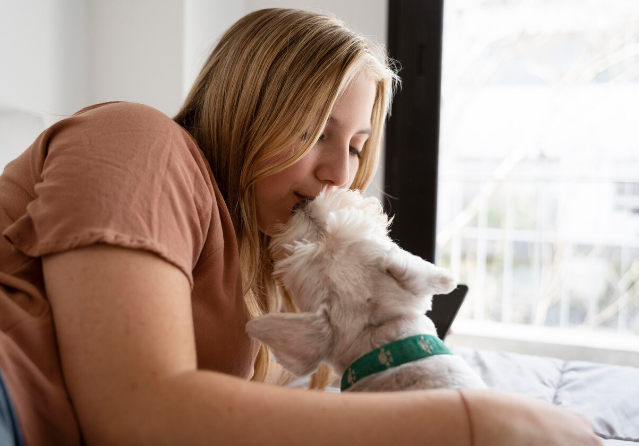
Psychiatric Service Dogs are likely the most controversial and debated type of service dog, with ongoing questions about their nature and regulations. It looks like the need for these dogs has drastically increased in the past year and with it also the number of discussions surrounding their legitimacy and effectiveness.
As you may have already figured out, today we will shed light on Psychiatric Service Dogs and address many common questions surrounding their raising and training!
What Are Psychiatric Service Dogs?
Psychiatric Service Dogs (PSDs) are a type of service animals, that are trained to perform specific tasks directly related to mental health conditions such as bipolar disorder, PTSD, anxiety, depression, schizophrenia, etc.
Psychiatric Service Dogs are NOT Emotional Support Animals, as unlike them, they undergo specialized training and do specific work for the benefit of their owner with a mental health issue.
With that being said, Psychiatric Service Dogs, are deemed a medical necessity and are entitled to public access and housing.

Who Is Eligible for a Psychiatric Service Dog?
Let’s see how the Americans with Disabilities Act defines a ‘disability’, thus the eligibility for a service dog.
Individuals who are diagnosed with any of the following health conditions (and other mental health issues) are eligible for a Psychiatric Service Dog, as long as the condition substantially limits a major life activity and the person needs a dog to perform specific tasks for them (not comfort and companionship only):
• Post-traumatic stress disorder (PTSD);
• Anxiety;
• Depression;
• Bipolar Disorder;
• Phobias;
• Schizophrenia, etc.
If you need a dog to help you with your mental health issues by providing comfort and companionship only, this dog won’t be considered a Psychiatric Service Dog, but a companion animal, and both, you and the dog, won’t be protected under the ADA.

Do You Need a Medical Letter for a Psychiatric Service Dog?
If you want to be covered in all areas of your life where your dog is involved, then - Yes! We will clarify further.
Most of you might have already familiarized yourselves with the ADA regulations that explicitly prohibit employees from requiring any documentation for service dogs. The two questions employees are legally permitted to ask are:
1. Is this a service dog due to a disability?
2. What tasks has the dog been trained to perform?
However, at the beginning of this portion, we deliberately mentioned ‘in all areas of your life’. As a service dog handler, you will likely find yourself in many situations where the assistance of your service dog is required, and these won’t only include visiting public places. What about at home and your workplace?
Imagine your housing provider has a ‘no pets’ policy and/or your employer does not allow pets on the premises.
In these situations, you should be able to present a medical letter for your psychiatric service dog, as the tasks these working dogs perform are not immediately obvious. In contrast to guide or mobility dogs who support individuals with ‘apparent’ disabilities, this is not the case with mental health conditions and psychiatric dogs.
Additionally, you may need to occasionally or actively travel with your Service Dog, including a Psychiatric Service Dog. Are airlines allowed to ask for medical documentation?
It depends on local laws and the specific itinerary!
US airlines can determine whether a dog is a service dog or not by:
1. Asking an individual with a disability if the animal is required to accompany the passenger because of a disability and what work or task the animal has been trained to perform;
2. Looking for physical indicators such as the presence of a harness or vests;
3. Looking to see if the animal is harnessed, leashed, or otherwise tethered; and
4. Observing the behavior of the animal.
For domestic flights, you are not likely to be asked to present a medical letter. However, this may not be the case for international flights, so always make sure to become familiar with service dog laws in the destination country and any transit countries you may travel through.
Furthermore, it is essential to note that some foreign airlines, e.g. Turkish Airlines, accept Psychiatric Service Dogs only on direct flights to/from the US. It is advisable to check local laws, and the policy of the airline you will be flying, and contact their agents in advance. This way, you will have time to plan and make adjustments if needed.
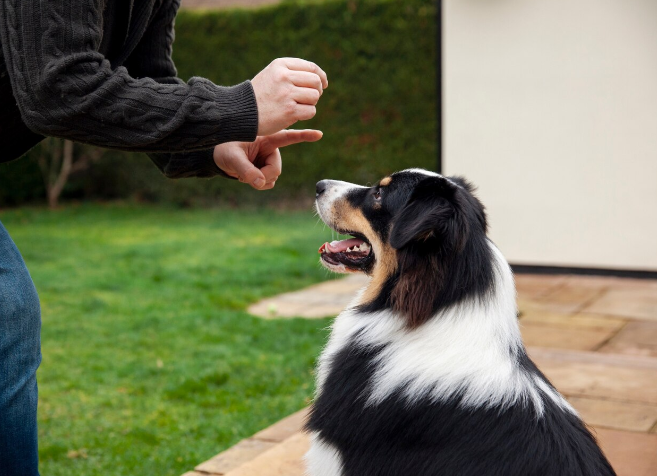
What Type of Training Do Psychiatric Service Dogs Undergo?
As with every type of service dog, Psychiatric Service Dogs also need to be trained in:
• Basic Obedience Training;
• Specific Service Dog Training (based on the individual’s needs);
• Public Access Manners.
Basic Obedience Training
There is no way for a dog to start with advanced/specific service dog training without first undergoing basic obedience. This is mandatory.
A dog must be able to reliably perform tasks like ‘sit’, ‘wait’, ‘come’, and ‘heel’ alongside calmly walking on a leash. During this stage of the training process, dogs learn about clickers (some handlers prefer to use vocal commands directly), and how to remain focused on their handlers.
Focus training is a critical component of basic obedience, which is based on eye contact and involves teaching the dog to maintain eye contact with their handler.
Walking on a loose leash, and teaching the dog to respond to commands consistently, alongside positive reinforcement, such as treats, praise, or toys, are additional crucial components of basic obedience training.
This stage is essential because it lays the foundation for more advanced training, helping dogs learn to stay attentive and responsive to their handlers.
During this period, handlers also take the opportunity to build a strong bond with their dogs and understand their individual needs and motivations. Each dog is unique, with their own needs and personalities. Remember that what works for one may not work for another!
Many dogs are highly food-motivated and respond well to specific treats, which makes them easy to train. In contrast, others may be more motivated by praise, petting, or toys. Identifying and wisely utilizing these motivators is crucial for effective training!
Additionally, handlers learn to be patient and flexible and adjust their training methods to suit their dogs’ personalities and learning styles.
Basic obedience training is not just a prerequisite but a foundation for advanced service dog training, as it ensures the dog has the necessary skills, focus, and motivation to progress to more complex tasks.
Specific Psychiatric Service Dog Tasks
There are many specific tasks a Psychiatric Service Dog can be trained to do! This type of training depends on the service dog user’s needs and the dog’s physical characteristics and temperament.
We will list below some common PSD tasks, however, keep in mind that these can be adjusted to best suit the person’s needs:
A dog learns to apply pressure by lying on their owner’s lap or by placing their chin on the owner’s lap. By using the weight and warmth of their body, a dog can tremendously help their handler calm down during anxiety or panic attacks.
Interrupting Harmful Behaviors
If the handler engages in self-harm or compulsive behaviors, a dog can be trained to interrupt these behaviors by providing tactile stimulation or redirecting the handler’s focus.
Alerting to Anxiety
Psychiatric Service Dogs can also alert their owners to the onset of anxiety episodes by recognizing the episode itself (association with anxiety) or recognizing and responding to specific behavioral patterns, known as ‘tells’.
Grounding
A dog can help ground the handler during episodes of dissociation or severe anxiety by performing tasks like nudging, licking, or fetching specific items.
Retrieving
PSDs can be trained to bring specific items to their handlers, such as medication or phone, when the handler is dizzy, overwhelmed, unresponsive, or otherwise unable to get certain items themselves.
Reminding to Take Medication
Specialized PSD training can also involve teaching a dog to remind their handler to take their medication at specific times. This can be particularly useful for those with memory issues related to their condition.
For this task, the dog is trained to recognize a specific time or routine associated with medication intake. This can be facilitated by using alarms or timers that signal to the dog when it's time to alert their handler.
As a next step, the dog learns a specific alerting behavior, which could include nudging, pawing, barking, or bringing a designated item to the handler. This consistent behavior helps the handler understand that it is time to take their medication.
Crowd Control
For individuals who experience anxiety in crowded spaces, a Psychiatric Service Dog can be trained to create physical space between them and others, or guide them through crowds.
Waking Up the Handler
If an individual experiences nightmares or night terrors, they can greatly benefit from a trained dog who wakes them up from distressing dreams and provides comfort.
Calling 911
Some service dogs, including PSDs, are trained to dial 911 in case of emergency. This task can be crucial for individuals who experience sudden medical crises or severe psychiatric episodes and are unable to make the call themselves.
Providing Physical Stability
While Psychiatric Service Dogs are not specifically trained as mobility dogs, providing physical stability can be a task they can perform for their owners. They can assist with mobility or stability, by providing support during moments of dizziness or disorientation.
Mental health issues can manifest differently in individuals, which is why the specific tasks performed by a trained Psychiatric Service Dog need to be adjusted to each person.
Public Access Manners
Teaching a dog good manners in public is another essential and mandatory component of service dog training!
Properly trained and reliable service dogs, regardless of their type, must be able to ignore distractions and remain focused on their handlers. They must not jump on people or animals, sniff for food, seek attention, eliminate in public (unless in the specifically designated areas), or otherwise misbehave and cause disruption.
Furthermore, they have to be under control at all times in public places. Teaching a dog to behave appropriately around distractions and potential triggers requires patience, consistency, gradual exposure, and proper socialization.
Desensitization and counter-conditioning are usually two training approaches that accompany the training process. Why is that?
Each dog has their own strengths and weaknesses and is more or less sensitive to certain stimuli in their environment.
A reliable service dog has to be able to fulfill their duty regardless of the situation. If there are certain triggers that could potentially interfere with the dog’s ability to perform the learned tasks, the canine needs to be desensitized toward these stimuli.
The gradual exposure to triggers by starting at a level where no reaction will follow and increasing the intensity step-by-step is known as desensitization.
Counter-conditioning, on the other hand, involves rewarding the dog when they are calm in the presence of the stimuli. By doing so, the dog will learn over time that the stimuli are paired with a positive outcome (reward) and will likely change their attitude towards them. This process is known as counter-conditioning.
Here, we will make three important clarifications:
1. A dog can react if they are provoked;
2. A dog can bark if barking is a task the dog performs for their handler;
3. A dog should be rewarded only if they are calm. Rewording them when they are agitated or fearful will worsen the negative association.

What Dogs Can Become Psychiatric Service Dogs?
As long as a dog is healthy and has the right temperament for the job, psychiatric service dog training will likely succeed! However, certain breeds have become popular because of their characteristics such as great social skills, trainability, intelligence, and a calm and friendly demeanor.
This does not mean, though, that all dogs of the same breed have the same personality traits. We advise you to perceive dogs as individuals and make a decision based on the individual dog. Of course, reviewing common breed characteristics and considering factors such as size, energy level, need for physical and mental stimulation, barking, etc., is highly recommended.
Typically, there are no restrictions on the types or breeds of dogs that can be trained as service dogs. We used “typically”, as this usually depends on local laws and whether certain breeds are banned.
For example, there are no breed restrictions in the US, while certain breeds are banned in the UK, for example:
• Pit BullTerrier;
• Japanese Tosa;
• Dogo Argentino;
• Fila Brasileiro.
Depending on where you reside, you should check if your government has banned certain breeds and what the procedure is to raise and train a dog of such a breed.
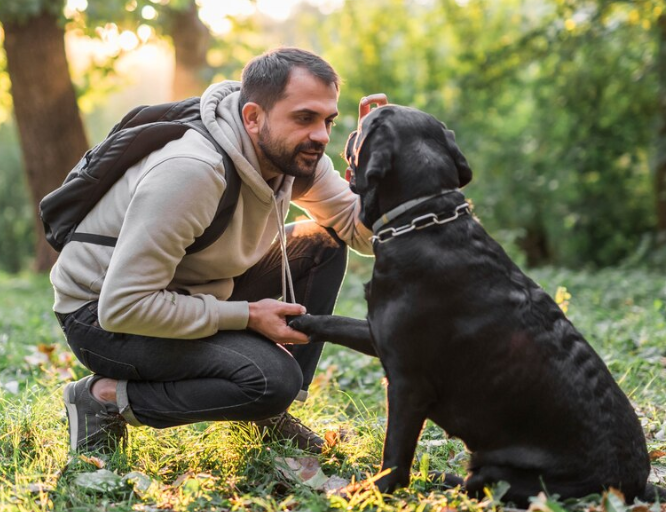
How Can You Train a Psychiatric Service Dog (Owner-Trained vs Professionally Trained)
Obtaining an Already Trained Psychiatric Service Dog
Many organizations and trainers specialize in various types of dog training, including puppy training, basic obedience, and specific service dog training. Some organizations train dogs to become service animals, and the process typically takes about two years, before matching a trained service dog with their future handler.
An indisputable advantage of this option is that the organization handles all the challenges that accompany all the stages of training, including evaluation, potty training, basic obedience, and specialized task training.
However, the cost of a fully trained service dog can be as high as $30,000 to $40,000. These costs are related to the extensive care and training needed to prepare a dog for their service duties. They can be prohibitive for many people in need of service dog assistance.
Furthermore, the service dog user misses out on the bonding experience during the dog's raising. Additionally, users must undergo training to learn how to work with their new service dog.
If you opt for a non-profit organization, please keep in mind that there are often long waiting lists, and you might wait for a year or longer before you are matched with a trained service dog.
Training Your Dog with an Organization, School, or Trainer
This option is way more cost-effective, compared to the previous one. It involves getting your dog trained with the help of a professional organization, school, or trainer.
While it is still costly, though, it is less expensive than obtaining a fully trained service dog. Costs vary based on the program, its duration, the reputation of the organization, location, and the trainer's qualifications and schedule.
This option allows you to participate in group or individual classes and be actively involved in the training process, which we consider a great advantage.
However, costs can still be significant, potentially reaching $1,000 to $2,000 weekly for boarding schools. Other disadvantages include the risk of not receiving sufficient attention in group classes and the need to follow the trainer's schedule.
Owner/Self-Training a Service Dog
This option has become very popular in the past years, as it is the most flexible and affordable one, allowing you to spend valuable time with your dog and develop a strong bond.
There are many online resources, including well-structured and easy-to-follow courses, that include tutor support. Owner/self-training your dog enables you to practice at your own pace, from the comfort of your home, and adapt the process to what best works for you and your dog.
Another great advantage of this option is that you know your dog as an individual and can decide what works and does not work for them. This helps adjust the training process.
The main disadvantage of this option is that it requires effort, a lot of patience, and consistency. You should be determined to not give up and commit to the training.
When choosing a program, school, organization, or trainer, you should do thorough research. It will help you consider costs, training methods, the level of involvement required, and the training duration.
If you opt for a trainer/organization/school/program, ensure that the training process is compatible with your needs and your dog’s personality. Additionally, make sure the process is legitimate.
Different programs and trainers may be more suitable for different individuals, so we advise you to find what works best for you!
Psychiatric Service Dog Registration & Certification
Many handlers want to register and certify their service animals to verify their legitimacy and avoid potential issues public.
However, it's essential to note that there is no official service dog registry in the US or the UK or websites endorsed by any government agencies that provide this service.
While registering a service animal can help inform the public that the dog is a service animal and not just a pet, it does not grant any additional rights to the dog or the handler.
However, if a service dog has completed a specialized training program and is registered with the company / has a certificate issued by the company, this can be very useful! Such information helps prove that the dog is a legitimate service dog, who has undergone proper training and has documentation as proof of this training.
Many business owners and landlords are suspicious of service dogs, who lack documentation as proof of training and/or identification.
We hope this guide will be helpful to you and provide you with the information you need to make an informed decision about potentially raising and training a Psychiatric Service Dog.




